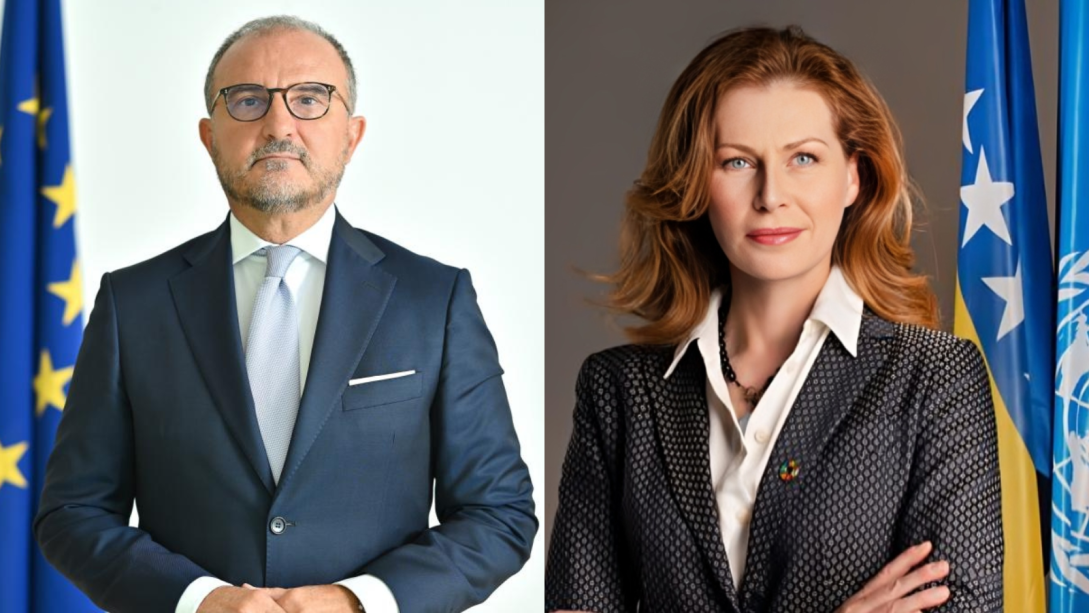Free Press, Strong Democracy: Upholding Our Shared Responsibility

More than three decades since the United Nations General Assembly declared World Press Freedom Day, the message remains more urgent than ever: a free, independent, and pluralistic press is essential to democracy, human rights, and peace. Today, we pay tribute to the courage and perseverance of journalists, editors and other media professionals in Bosnia and Herzegovina and around the world.
World Press Freedom Day is not only a day of recognition; it is a call to action. It reminds governments of their responsibility to protect media freedom, and it calls on media professionals to continue serving the public interest with professionalism and integrity.
On this day, the United Nations and the European Union in Bosnia and Herzegovina reaffirm our unwavering commitment to supporting media freedom and democratic values. Together, we work to strengthen institutions, protect civic space, and foster independent journalism—building a more inclusive and democratic future for Bosnia and Herzegovina.
Recent years have unfortunately seen significant setbacks in media freedom. Media outlets operate in an unfavourable economic environment, compounded by the absence of a comprehensive or consistent legislative framework.
Bosnia and Herzegovina’s ranking in the 2024 World Press Freedom Index dropped notably, reinforcing concerns over the erosion of democratic standards. The latest European Commission Report on Bosnia and Herzegovina notes that political pressure, intimidation and harassment of journalists continue, including physical and verbal attacks, with no appropriate institutional follow-up. Political influence over public broadcasters persists, and their financial sustainability is increasingly at risk.
According to SafeJournalists, since the start of 2025, incidents of threats and intimidation—particularly against women journalists—have risen sharply while instances of refusing access to press conferences and attempting to discredit journalists by labelling them as public enemies or foreign agents—were observed.
In Republika Srpska, the reintroduction of criminal defamation and the adoption of the Law on the Special Registry and the Publicity of the Work of Non-Profit Organizations have already had a chilling effect on civil society actors and the media, despite the suspension of the latter by an interim decision of the Constitutional Court of Bosnia and Herzegovina.
While the situation in Republika Srpska is particularly acute, some legislative initiatives in the Federation of Bosnia and Herzegovina—at both entity and cantonal level—such as those intended to tackle online disinformation or gender-based violence have included provisions in earlier drafts that could be abused to restrict media freedom. Bosnia and Herzegovina’s dynamic and determined civil society, as well as the actions of lawmakers, have ensured that some problematic initiatives have not become law, but the threat of legislation that would shrink civic space remains.
This is not to argue that there can never be any restrictions whatsoever on speech. Freedom of expression can never mean freedom from responsibility. Indeed, targeted restrictions, such as those prohibiting hate speech, defined as “advocacy of national, racial or religious hatred that constitutes incitement to discrimination, hostility or violence” are essential. However, restrictions need to be based on law and strictly necessary for the respect of the rights or reputations of others or for the protection of national security, public order, public health or morals.
Amid the challenges, there are also reasons for cautious optimism. For example, over the past years, contact points in law enforcement and judicial bodies for the safety of journalists have been appointed across the country, but much more needs to be done. During the recent Universal Periodic Review of Bosnia and Herzegovina, sixteen recommendations from United Nations Member States explicitly addressed media freedoms, including the safety of journalists and accountability for attacks and threats targeting them.
Safeguarding the space for critical, fact-based public debate is essential. This is not the responsibility of journalists alone—it must first and foremost be the responsibility of political leaders and institutions. On this World Press Freedom Day, we reaffirm our commitment to a media environment where journalists can work freely and safely. Protecting media freedom is not only about defending the press—it is about safeguarding democracy itself.
We call on all authorities in Bosnia and Herzegovina to take concrete steps: protect journalists from threats and violence, prevent political interference in the media, ensure accountability for attacks, and review laws that restrict freedom of expression. These actions are crucial not only to meet international obligations but also to advance Bosnia and Herzegovina’s path toward European Union membership.
